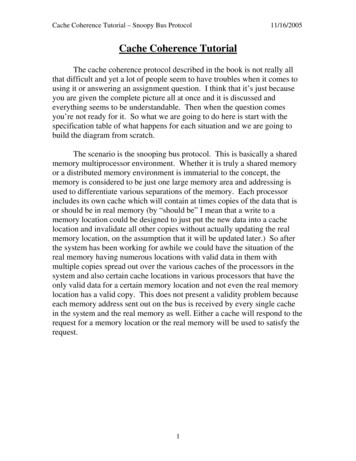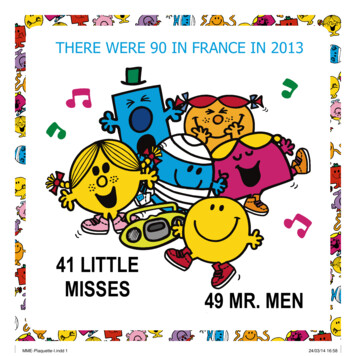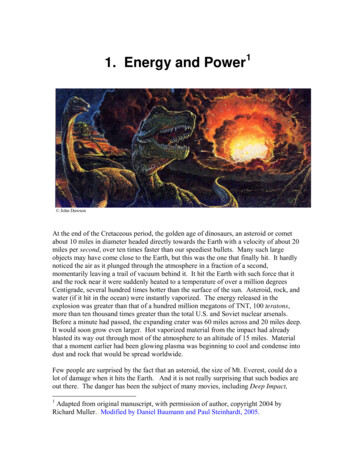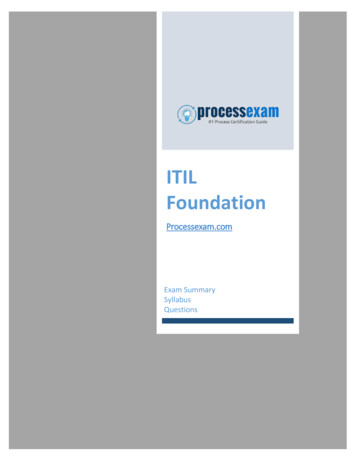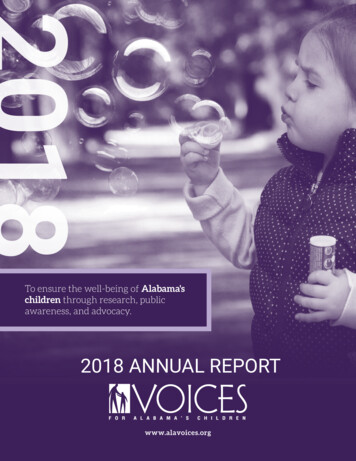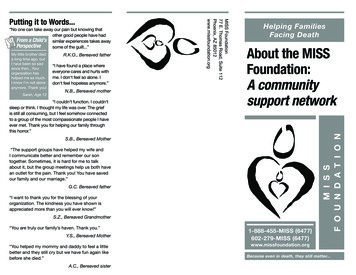
Transcription
My little brother dieda long time ago, butI have been so sadsince then.Yourorganization hashelped me so much.I know I’m not aloneanymore. Thank you!Sarah, Age 13R.K.O., Bereaved father“I have found a place whereeveryone cares and hurts withme. I don‘t feel so alone. Idon‘t feel hopeless anymore.”N.B., Bereaved mother“I couldn‘t function. I couldn‘tsleep or think. I thought my life was over. The griefis still all consuming, but I feel somehow connectedto a group of the most compassionate people I haveever met. Thank you for helping our family throughthis horror.”Helping FamiliesFacing DeathAbout the MISSFoundation:A communitysupport networkS.B., Bereaved Mother“The support groups have helped my wife andI communicate better and remember our sontogether. Sometimes, it is hard for me to talkabout it, but the group meetings help us both havean outlet for the pain. Thank you! You have savedour family and our marriage.”G.C. Bereaved father“I want to thank you for the blessing of yourorganization. The kindness you have shown isappreciated more than you will ever know!”S.Z., Bereaved Grandmother“You are truly our family’s haven. Thank you.”Y.S., Bereaved Mother“You helped my mommy and daddy to feel a littlebetter and they still cry but we have fun again likebefore she died.”A.C., Bereaved sister1-888-455-MISS (6477)602-279-MISS (6477)M I S SF O U N D A T I O N“No one can take away our pain but knowing thatother good people have hadFrom a Child’s similar experiences takes awayPerspectivesome of the guilt.”MISS Foundation77 E. Thomas Road, Suite 112Phoenix, AZ 85012www.missfoundation.orgPutting it to Words.www.missfoundation.orgBecause even in death, they still matter.
Our Community Support Programs:Family Packets - MISS Foundation informationmailed to new familiesCrisis Outreach Team - MISS volunteers respondto crisis situations to provide supportSupport Groups for parents, grandparents &siblings across the US and internationallyHOPE Mentors - “Helping Other Parents Endure”- other bereaved parents become the one onepoint of support for familiesOnline Forum - online support group that ismoderated by trained bereaved parentsPerinatal Palliative CARES Program – servesfamilies who receive a prenatal diagnosis that isnot compatible with lifeOne-on-One Grief Counseling – in person or viaSkype - on sliding scale fee scheduleChanging the Way our Culture Mourns Campaign –“One Who Soars” & “In Mourning Bands”MISSing Angels Newsletter – Families sharepersonal stories of their childrenBi-Weekly MISS Member ENewsBi-Weekly MISS Volunteer ENewsGrief WorkshopsBi-Annual Grief ConferenceMISSing Angels Bill Legislation - Certificateof Birth Resulting in Stillbirth - for families whohave experienced stillbirthKindness Project - families continuing their child’slegacy by performing random acts of kindnessKindness Walks - Awareness/Fundraising Walksin Remembrance of the children gone too soonThe MISS Foundation often gets asked “How can Ihelp?” from well intentioned loved ones. They wantto know what practical steps they can take to helpthe bereaved family. Here are some suggestionsfrom the bereaved families themselves: Fear of being alone Somatic/physical complaints such asstomachaches and headaches Inability to concentrate or focus Guilt over failure to prevent the lossHow Best to Help a Grieving FamilyOne of the best ways to help a family touched bythe death of a child is by offering them long-term,unconditional support. Listen. Provide practical aidsuch as cooking meals, helping with childcare, andrunning errands. Don’t try to fix them. Express yourlove. Give them permission to feel their sadness.Remember special days. Be there for them, anddon’t rush their grief. For more information, visitour website: www.missfoundation.orgYou don’t heal from death of a loved one becausetime has passed. You heal because of what youdo with that time.Ways You Can Help Share news of the MISS Foundation to familyand friends who have lost a child Depression or a loss of interest in dailyactivities Regressive behavior—acting much younger orreverting to earlier behaviors Forgetfulness Apathy Extreme emotional outbursts Hyper-sensitivityMISSFOUNDATIONMore than 120,000 children die everyyear in the United States. After the deathof a child, families experience significanttrauma and grief that can complicate andsend ripples of grief through a community. Donate to the MISS Foundation Volunteer for the MISS Foundation www.missfoundation.orgUnderstanding GriefMost traumatic events in life bring grief to a person.Here are some manifestations of grief that a personmay experience after the death of a loved one: Sadness and depression Denial, shock, and confusionNational Children’s Memorial Day Anger and irritabilityBarefoot Walkabout Inability to sleepCulturally sensitive research and advocacy Nightmares or fear of sleep Loss of appetiteThe MISS Foundation is a 501c3 organizationthat CARES for families and communitiesbefore, during and after the death of a child.We provide family packets, outreach,support groups, HOPE Mentors, an onlinesupport forum, one-on-one counseling,newsletter, events, conferences,research, advocacy, Perinatal PalliativeCARES Program, and opportunities forvolunteerism that allow people affected bychild death a place to begin to heal.www.missfoundation.org1-888-455-MISS (6477) or 602-279-MISS (6477)info@missfoundation.org
The MISS Foundation is a 501c3 organizationthat CARES for families and communitiesbefore, during and after the death of a child.How can I help?The Do’s andDon’ts of GriefSupportWe provide family packets, outreach,support groups, HOPE Mentors, an onlinesupport forum, one-on-one counseling,newsletter, events, conferences,research, advocacy, Perinatal PalliativeCARES Program, and opportunities forvolunteerism that allow people affected bychild death a place to begin to heal.www.missfoundation.org1-888-455-MISS (6477) or 602-279-MISS (6477)info@missfoundation.org1-888-455-MISS (6477)602-279-MISS (6477)M I S SF O U N D A T I O NMore than 120,000 children die everyyear in the United States. After the deathof a child, families experience significanttrauma and grief that can complicate andsend ripples of grief through a community.MISS Foundation77 E. Thomas Road, Suite 112Phoenix, AZ oundation.orgBecause even in death, they still matter.
The MISS Foundation often gets asked “How can Ihelp?” from well intentioned loved ones. They wantto know what practical steps they can take to helpthe bereaved family. Here are some suggestionsfrom the bereaved families themselves: Do allow them to talk about the child that hasdied as much and as often as they want. Don’t change the subject when they mentiontheir child. Do talk about the special, endearing qualitiesof the child. Do give special attention to the child’s brotherand sister--at the funeral and in the months tocome (they too are hurt and confused and inneed of attention which their parents may notbe able to give).Don’t push the parents through the grievingprocess, it takes a long time to heal and theynever forget. Don’t encourage the use of drugs or alcohol. Don’t ask them how they feel if you aren’twilling to listen. Don’t say you know how they feel. Don’t tell them what they should feel or do. Don’t try to find something positive in thechild’s death. Don’t point out that at least they have theirother children (If they do). Don’t say that they can always haveanother child.How Best to Help aGrieving FamilyOne of the best ways to help a family touched bythe death of a child is by offering them long-term,unconditional support. Listen. Provide practical aidsuch as cooking meals, helping with childcare, andrunning errands. Don’t try to fix them. Express yourlove. Give them permission to feel their sadness.Remember special days. Be there for them, anddon’t rush their grief. For more information, visitour website: www.missfoundation.org or our InMourning Bands Campaign www.inmourningband.org. “The friend who can be silent with us in amoment of despair or confusion, who can staywith us in an hour of grief and bereavement,who can tolerate not knowing. not healing, notcuring. that is a friend who cares.” Henri Nouwen Do ask, “How are you REALLY doing?” Do remember that you can’t take away their pain,but you can share it and help them feel less alone. Do let your genuine concern and care show. Do call the child by name. Do treat the couple equally. Fathers need asmuch support as mothers. Do be available.to listen, to run errands, todrive, help with the other children, or whateverelse seems needed at the time. Do say you are sorry about what happened totheir child and about their pain. Do accept their moods whatever they maybe, you are not there to judge. Be sensitive toshifting moods.Do put on your calendar the birth and deathdate of the child and remember the family thefollowing year(s). That you remember the childis very supportive. Do extend invitations to them, but understandif they decline or change their minds at thelast minute. Don’t suggest that they should be gratefulfor their other children. Above all continue to call and visit! Do send a personal note or letter or make acontribution to a charity that is meaningful tothe family.Don’t think that death puts a ban onlaughter. There is much enjoyment in thememory of the time they had together. Do get literature about the disease and griefprocess to help you understand.THE DO’S Do reassure the parents that they dideverything they could, that the care the childreceived was the best possible.THE DON’TS Don’t be afraid to ask about the deceasedchild and to share memories. Don’t simply ask “What can I do”, just do it!Often everyday tasks become overwhelming,such as grocery shopping or doing the dishes,just pitch in and do it. Don’t think that the age of the childdetermines his/her value and impact. Don’t be afraid to offer a hug or a neutral touch,it can often be more comforting than words. Don’t avoid them because you feel helpless oruncomfortable, or don’t know what to say.Avoid the following clichés:“Be brave, don’t cry.”“It was God’s will” or “it was a blessing.”“Get on with your life. This isn’t the end ofthe world.”“God needed another flower in his garden.”“At least he/she wasn’t older.”“You must be strong for the other children.”“You’re doing so well.”“You’re young, you’ll get over it.”“Time will heal.”“Everything happens for a reason.”
To help families make decisions based on thelove that they have for their baby To assist families in cherishing the timebetween the diagnosis and death of their baby To honor the unique and special qualities ofeach baby To emphasize the quality of life over thequantity of lifeWhen Birth andDeath MergeFamilies Affected byFatal Birth AnomaliesPerinatal PalliativeCARES Program To reduce the emotional, spiritual andpsychosocial suffering using interventionssensitive to cultural, religious and personal beliefsBecause even in death, they still matter.1-888-455-MISS (6477)602-279-MISS (6477)M I S SF O U N D A T I O N To help families understand the diagnosis andprobably outcomes for their babyMISS Foundation77 E. Thomas Road, Suite 112Phoenix, AZ 85012www.missfoundation.orgPerinatal Palliative CARESProgram Goals:www.missfoundation.orgBecause even in death, they still matter.
Why My Child?How We Can Help.Fatal birth anomalies are amongst the mostpainful losses we can experience. They candeny us a chance at a family and can leavesightless our vision for immortality throughgenerations of the future. It may be difficultfor parents not to blame themselves for thefatal diagnosis. This is compounded due tothe fact that fatal birth defects are caused bya combination of genetic and environmentalfactors. It is important to remember that yourbaby is unique, special, and loved. No oneshould expect you to “forget” or “get over”their existence, but rather, encourage you toacknowledge their life as your child. Care Coordination between the medicalcommunity and the family Creating Birth Plans to express your wishes foryour care and your baby’s care Individualized childbirth education Memory box containing keepsakes Memory book for capturing details of your journeyIf you are a clinician or if you know of a familyfacing a poor prenatal diagnosis, please call:602.279.MISS (6477)or email:info@missfoundation.org“The love of a parent is not contingent uponthe amount of time we had with our child. Lovesimply cannot be measured in time.”- Joanne Cacciatore Connections with community resourcesStrengthen Social Support Systems Anticipatory Grief Education & Emotional SupportThe Perinatal Palliative CARES Program iscommitted to helping families who are facing apoor prenatal diagnosis.We realize the heartbreaking reality encounteredwhen families are told their baby will not survive.Parents may feel an overwhelming sense ofloneliness and despair when confronted withdecisions that must be made concerning thepoor prognosis of their child.Gone from our sight,but never our memories.Gone from our touch,but never our hearts. Creative activities to aid the expression of grief Book suggestions Journal & Journaling education Sibling resoures and gifts for surviving siblings Assist in scheduling of professionalphotographers Connections with spiritual support within yourbelief system HOPE Mentoring with other families withsimilar experiences Assistance with funeral planning andmemorialization ideas Support GroupsMISSFOUNDATIONMore than 120,000 children die everyyear in the United States. After the deathof a child, families experience significanttrauma and grief that can complicate andsend ripples of grief through a community.The MISS Foundation is a 501c3 organizationthat CARES for families and communitiesbefore, during and after the death of a child.We provide family packets, outreach,support groups, HOPE Mentors, an onlinesupport forum, one-on-one counseling,newsletter, events, conferences,research, advocacy, Perinatal PalliativeCARES Program, and opportunities forvolunteerism that allow people affected bychild death a place to begin to heal. Sliding Scale Grief Counselingwww.missfoundation.org1-888-455-MISS (6477) or 602-279-MISS (6477)info@missfoundation.org
The word, bereavement, literally means “to bedeprived by death.” A child’s death arouses anoverwhelming sense of injustice—for lost potential,Grief, Mourning, andBereavementNo Greater Loss:When aChild Dies.unfulfilled dreams and senseless suffering.Parents may feel responsible for the child’s death,no matter how irrational that may seem. Parentsmay also feel that they have lost a vital part oftheir own identity.The MISS Foundation wants you to know that youare not alone. We can help your family get throughthis inconceivable sorrow while still holding thememory of your beloved child close to your heart.We go on, but we never forget.Because even in death, they still matter.1-888-455-MISS (6477)602-279-MISS (6477)M I S SF O U N D A T I O NThere is no more devastating human experiencethan the death of a child. Yet, you are not alonein your grief. Sigmund Freud, Mark Twain, JohnF. and Jackie Kennedy, Abraham Lincoln, andGandhi are just several historical figures whoshared the tragic experience of a child’s death.It is life’s most stressful event causing emotionalcrises and the potential for long-term posttraumatic stress disorder (PTSD).MISS Foundation77 E. Thomas Road, Suite 112Phoenix, AZ 85012www.missfoundation.orgPutting it to Words.www.missfoundation.orgBecause even in death, they still matter.
What you may feel:When you experience the death of your child, youmay experience a wide range of emotions. Manyparents feel an initial stage of numbness after firstlearning of the death. There is no real order to thegrieving process, however here are some emotionsyou may experience: DenialDisbeliefConfusionShockAnger or RageSadness and DepressionYearningHumiliationDespairGuilt and ShamePhysical Symptoms such as a tightness inyour chest, headaches, lethargy.When to get professional help: If your grief has left you feeling suicidalIf your have prolonged periods (more than oneweek at a time) of a change in sleep patternsIf you have prolonged periods of a change inappetiteIf you have recurrent dreams which make itdifficult to function dailyIf you are currently attending a grief supportgroup and feel it is not enoughfeel so alone. We are here to help you throughthis tragedy through our website and monthlysupport group meetings for children, parents, andgrandparents. Call for more information. Here aresome other ideas for taking care of yourself: How to help yourself: Parents often struggle to fit in the day to dayroutine they once knew. You may not feel like youeven know who you are any longer in the absenceof your precious child. Some of us learn to fitit back in to our lives by wearing an, “I am finemask.” Taking care of yourself right now should bea priority. This is an overwhelming experience forthe entire family and community, yet you may often Sleep: Give yourself plenty of time to rest.Grief is emotionally draining and you will needto recharge more often. If you don’t want toget out of bed in those early stages of grief,then don’t!Exercise: Take walks, work out, or springclean. Physical exertion is a great stressreliever and may afford you some time aloneto gather your thoughts in the process.Be patient with yourself: Your emotions maybe unpredictable and unstable for monthsafter the death of your child. You may also bemore irritable than normal and concentrationmay be a difficult task.Keep a journal: This is self-therapy for grievingparents. Write every night, even if it is just afew lines.Cry, cry, cry: Tears are very healing. Allowyourself alone time everyday to cry. Also,realize that crying in front of children is notbad for them.Meditate: Quiet, deep thinking and meditationcan help you reestablish emotional clarity.Couples can even do this together.Claim your feelings: Grieving parents strugglewith many emotions. Try not to succumb toexternal forces encouraging you to hastilymove through those emotions.Read: Be proactive. Read about others’experiences and ideas for grief.Avoid major changes: Don’t make majordecisions that will dramatically change yourlife now. Wait until the first few monthsof grief have passed before making lifealtering decisions.Don’t expect to get over it: You do live on,and will be happy again and you will survive,but you probably will never get over it. It is agentle and gradual acceptance that happensover many years. Join a support group: Support groups helpconnect bereaved parents and children withlike others. The MISS Foundation has 74chapters around the world. We also have 27online support groups in a section called the“forums.” Visit www.missfoundation.org formore information.Ritualize: Find ways to memorializeyour child. The MISS Foundation has“In Mourning Bands” available (www.inmourningband.org) as well as theKindness Project as a wonderful way tohonor a child who died too soon. See www.missfoundation.org for more information.MISSFOUNDATIONMore than 120,000 children die everyyear in the United States. After the deathof a child, families experience significanttrauma and grief that can complicate andsend ripples of grief through a community.The MISS Foundation is a 501c3 organizationthat CARES for families and communitiesbefore, during and after the death of a child.We provide family packets, outreach,support groups, HOPE Mentors, an onlinesupport forum, one-on-one counseling,newsletter, events, conferences,research, advocacy, Perinatal PalliativeCARES Program, and opportunities forvolunteerism that allow people affected bychild death a place to begin to heal.www.missfoundation.org1-888-455-MISS (6477) or 602-279-MISS (6477)info@missfoundation.org
The death of a loved one is always difficult. Forchildren, the loss of a sibling, parent, or friendcan affect their sense of security, self-esteem,and it can de-center them. The family and thecommunity can help children who are grieving.This type of support will enable the children toresume their lives more fully at home and atschool. Parents, teachers, medical professionals,and community leaders all play an important rolein the life of the grieving child.MISS Foundation77 E. Thomas Road, Suite 112Phoenix, AZ 85012www.missfoundation.orgHelping Children CopeWith Loss.Children are theforgotten grievers Helping GrievingChildren1. Children need comfort and frequentreassurance that they’re safe, loved, andtaken care of.2. Be honest, simple, and direct when talking tothem about death.3. Encourage them to express their feelingsthrough talking, drawing, and playing.4. Try to maintain a normal routine.5. Find local children’s support groups to help.How to Help Children:Avoid telling them that God took their loved one.Avoid associating death with sleep or something‘lost.’ Remember children are very literal. Allow them to participate in rituals such asfunerals, memorial services, and candlelightings.Children at all ages should be offered theopportunity to say goodbye to their loved one. Encourage questions. Do not discourage themfrom talking about their pain. Be patient and very gentle with them. Try notto yell at, hit, or isolate them even monthsafter the death. Children may appear to be“misbehaving” but are actually manifestinggrief symptoms.1-888-455-MISS (6477)602-279-MISS (6477)M I S SF O U N D A T I O NQuick Tips for Adultswww.missfoundation.orgBecause even in death, they still matter.
How Children RespondTo Death. Here are some common ways in which children may respond to a death: Sadness Denial, shock, and confusion Anger, irritability, and ‘bad’ behavior Inability to sleep Nightmares or fear of sleep Loss of appetite Fear of being alone Somatic/physical complaints such as stomachaches and headaches Inability to concentrate or focus Guilt over failure to prevent the loss Depression or a loss of interest in daily activities Regressive behavior—acting much younger orreverting to earlier behaviors Withdrawal from friends Sharp drop in school performance Talking frequently and asking repeatedquestions about the death, or making repeatedstatements of wanting to join the deceased. Profound emotional reactionsHow To Help a Grieving Child: Children are physical in their grief process.Interact with them when play and support theirspecial ‘language’ of grief expression. Art andwriting are particularly helpful. Young children are concrete thinkers. Avoidexpressions such as “passed on,” “at rest,” or“we lost” when talking about the person whodied. Be direct and honest. Offer only what theycan absorb and keep it simple. Children can be fearful about death and feelinsecurity about their future. Give them achance to discuss those fears and validate theirfeelings. Offer the support of another adult theytrust as children hesitate talking to their parentsabout their true grief feelings.1. Extended periods of depression in which he orshe loses interest in daily activities and events. Be patient with the child. Children are notable to express overwhelming sadness intowords, so try to interpret perceived behaviorproblems as manifestations of grief. Be moreflexible in punishment and we suggest positivereinforcement rather than harsh discipline.Yelling, hitting, or isolating a grieving child canexacerbate the symptoms and creates a viciouscycle for the family.4. Withdraws from friends at school. Keep routines as much as possible. Try notto make any major decisions for 18 months.Children need to be assured that they havesecurity, stability, and love. Adults can provide a good grief “model” forthe grieving child. Share an ‘open emotion’policy and allow yourself, and your child, tocry when needed. Your openness will validatetheir feelings. Children are intermittent grievers. Just becausethey don’t cry everyday doesn’t mean theyaren’t hurting. Some children cry for one minuteand jump right back into normal play. Expect their grief to revisit during theirchildhood and through adolescence. Triggersawaken old grief. Make yourself available. Shower them with affection and attention. Ifyou are feeling too overwhelmed with your owngrief, call a friend, a support group, your church,or someone else who can help!Because death brings many complications fora family, we recommend a therapist evaluation,when possible, to determine how the child iscoping with their grief. Particular symptoms tolook for include:2. Inability to sleep, loss of appetite, prolongedfear of being alone.3. Acting much younger for extended period of time5. Sharp drop in performance or refusal toattend school.Do you know of a child who needs help?Please call: 1-888-455-MISS (6477)or 602-279-MISS (6477)MISS Foundation office phones are answeredMonday-Friday from 8am - 4pmMISSFOUNDATIONMore than 120,000 children die everyyear in the United States. After the deathof a child, families experience significanttrauma and grief that can complicate andsend ripples of grief through a community.The MISS Foundation is a 501c3 organizationthat CARES for families and communitiesbefore, during and after the death of a child.We provide family packets, outreach,support groups, HOPE Mentors, an onlinesupport forum, one-on-one counseling,newsletter, events, conferences,research, advocacy, Perinatal PalliativeCARES Program, and opportunities forvolunteerism that allow people affected bychild death a place to begin to heal.www.missfoundation.org1-888-455-MISS (6477) or 602-279-MISS (6477)info@missfoundation.org
Support groups are another way to help a personestablish a safe place to express difficult emotionsand ameliorate feelings and symptoms associatedwith the trauma.Understanding Trauma& Bereavement Post-TraumaticStress Disorder(PTSD)Other things that may help: Eating well and taking good multiple vitaminsand minerals Daily exercise Establishing new routines or hobbies Daily JournalingCan Children Experience PTSD?Yes. When children are involved, ensuring that theother family members are part of the therapy andintervention plan is critical to assist the child in moreexpedient resolution of the PTSD symptoms. Also,remember that children may not manifest the samesymptoms as adults. And, as with adults, often itcan be dismissed or misdiagnosed, according tothe PTSD Alliance. Their PTSD symptoms mayshow in social, behavioral, and sleep changes.It is important that children are well-supportedduring times of high-stress and trauma. A therapistcan provide a good outlet for children. Books,resources, sharing or support groups and openfamily discussion may also help the child.Please call your doctor if you believe that you orsomeone you love is suffering from PTSD.1-888-455-MISS (6477)602-279-MISS (6477)M I S SF O U N D A T I O NWhat can be done about PTSD?Each situation is unique, however, someonesuffering from symptoms should consider seekingcounseling or psychotherapy. In addition, the personmay want to evaluate what they are doing to helpthemselves through the resultant post-trauma grief.MISS Foundation77 E. Thomas Road, Suite 112Phoenix, AZ 85012www.missfoundation.orgWhat Can Be Done if youThink You Have PTSD?www.missfoundation.orgBecause even in death, they still matter.
Understanding GriefMost traumatic events in life bring grief to aperson. Here are some manifestations of griefthat a person may experience after the death ofa loved one: Sadness and depressionDenial, shock, and confusionAnger and irritabilityInability to sleepNightmares or fear of sleepLoss of appetiteFear of being aloneSomatic/physical complaints such as stomachaches and headachesInability to concentrate or focusGuilt over failure to prevent the lossDepression or a loss of interest in daily activitiesRegressive behavior—acting much younger orreverting to earlier behaviorsForgetfulnessApathyExtreme emotional outburstsHyper-sensitivity“You don’t heal from death of a lovedone because time has passed. You healbecause of what you do with that time.”– Joanne CacciatoreFrequently Asked Questions:What is PTSD?PTSD is a cluster of symptoms that can occurwhen a very traumatic incident occurs in aperson’s life. Trauma often initially leaves aperson feeling powerless, victimized, andemotionally, physically, and mentally paralyzed.Types of trauma that increase a person’s chanceof experiencing PTSD include the death of achild, hurricanes and other natural disasters,fires, severe transportation accidents (auto,plane), victimization by criminal activity (rape,burglary, assault), witnessing violence, rape,prolonged trauma such as war, child sexualabuse, cult involvement, and verbal/ emotionalfamilial abuse. PTSD can also frequently occurmonths after the death of a loved one.What are the effects?The effects of PTSD can be subtle or theycan be overt. They can include extreme moodswings, uncontrollable outbursts, irrational longterm fears, physiological symptoms (somatic)such as headaches, lethargy, digestive troubles,repetitive disturbing nightmares, and a changein appetite. Self destructive behaviors can alsoappear in some such as drug and alcohol abuseor self-mutilation.According to the Post Traumatic StressDisorder Alliance, recognizing PTSD includesidentifying clusters of symptoms that have beenpresent for one month or longer which cause“severe problems or distress.” Some of theindicators include:1. Reliving the event through nightmaresor other uncontrollable and “intrusive”thoughts. Often this replay causes physicalstressors such as heart palpitations,headaches, or sweating.2. Avoidance of reminders of the event ordeath which includes a person going outof their way to avoid places, people, oractivities associated with the trauma.3. Hyper-arousal and sensitivity at all timesmaking it difficult to concentrate, work,
Phoenix, AZ 85012 www.missfoundation.org Because even in death, they still matter. MISS FOUNDATION 1-888-455-MISS (6477) 602-279-MISS (6477) www.missfoundation.org Putting it to Words. "No one can take away our pain but knowing that other good people have had similar experiences takes away some of the guilt." R.K.O., Bereaved father
